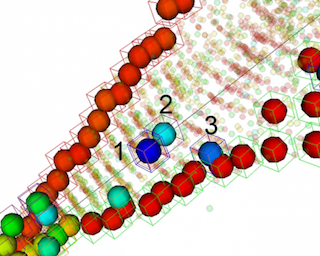Use Case
Water Resource Management Using OPENMORDM Data
P. Reed (Cornell) with G. Characklis (UNC Chapel Hill), K. Keller (Penn State), and B. Barker, P. Vaillancourt, B. Wineholt (Cornell CAC). Testing and evaluation of the MORDM framework will leverage a collective partnership between Reed and the water utilities from the North Carolina cities of Cary, Durham, Raleigh, and Chapel Hill
What?
- On-demand simulation of complex water resource management outcomes to achieve substantial beneficial environmental impact on municipalities across the country
Why Aristotle?
- Coarsely parallel computations started on demand
- Very large computations, ideal for transfer to AWS or other cloud, to make available to many municipalities
Accomplishments
- Built and tested Parallel Platypus software (the Python version of Open MORDM) with a VM, container, and container source (Docker file) developed by the Aristotle team for use as a virtual MPI cluster on Aristotle.
- Added Docker documentation to the Aristotle wiki.
- Containerized and published build scripts for the Lake Problem code and successfully ran it in MPI across multiple virtual machines using Docker; this will allow distributed scientific software to be executed faster at cloud scale, both in existing institutional cloud, XSEDE resources, and public provider clouds.
- Regenerated all published results for the multi-node MPI Lake Problem simulation which will serve as validation of our containerization methodology.
- Ran MPI between Docker containers on multiple VMs with the Lake Problem code on Aristotle and Jetstream.
- Tested the Open MORDM group MPI WaterPaths software in a Docker container on single and multiple VMs. The goal is to show that WaterPaths can be used in the cloud with a performance comparable to that under HPC.
- Successfully performed OpenMORDM WaterPaths production runs at scale using up to 224 CPU cores on 8 worker VMs organized into an on-demand cloud MPI cluster with Docker container-based software deployment.
- Developed Terraform and Ansible scripts for on-demand creation of OpenStack cluster VMs with Docker installed and provisioned a cluster-shared NFS storage server.
- Modified an existing Docker container to create a VM for initial tests with WaterPaths, which automatically clones and compiles WaterPaths and Borg and downloads all necessary data files.
- Ran standalone WaterPaths simulations and small-scale optimize runs with four MPI processes (one master and three slaves).
- Defined guidelines for our next steps, which will include timings and MPI profiling. The Aristotle team is currently working on (1) using the same size VM with 28 cores, setting up 3 Docker containers to use 8 cores each, (2) setting up a small cluster of 3 VMs, each with 8 cores, with a single Docker container on each that uses all 8 cores, (3) setting up a larger cluster of 8 VMs, each with 28 cores, with a single Docker container on each VM. The timings and MPI profiling will allow for at least two publications, one focused on WaterPaths and the other on the cloud itself.
Plans
- David Gold is continuing the work of Bernardo Trindade on MORDM and WaterPaths.
- Consider building on our initial scaling analysis for WaterPaths and using Aristotle to support our water supply infrastructure investment and portfolio management analysis.
- Use Aristotle to more fully evaluate the core steps of our workflow: (1) generate alternatives with multi-objective optimization, (2) ensemble Monte Carlo evaluation of candidate alternatives in a broader sampling of state-of-the-world, (3) elicit acceptable limits and requirements on the range of performance attained on key measures of performance, (4) global sensitivity analysis to discover what factor and scenarios cause system failures. The workflow can be tested on a range of broader case studies such as the Sedento Valley benchmarking system, North Carolina Research Triangle, and the Tampa Bay Water Authority.
- Developed 3 new collaborations that wish to leverage Aristotle infrastructure, tools and techniques: (1) Woods Hole Oceanographic Institute and UCSB Marine Sciences plan to study forest dynamics by fusing and analyzing remote sensing data from the seabed and atmosphere off the coast of CA, (2) DOE researchers are building ground-based cloud observation networks to study cloud formation and lifecycle dynamics and will use Aristotle artifacts to deploy two new observation networks at Sedgwick and Long Island, (3) the Math Dept. at Cal State Long Beach will use Aristotle science team expertise in using, maintaining, and scaling clouds to automate and scale its calculus curriculum.
Products
